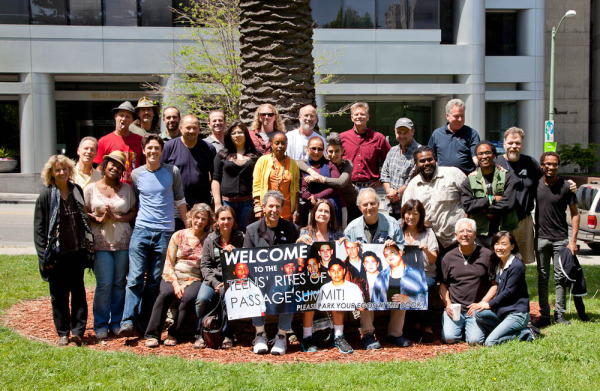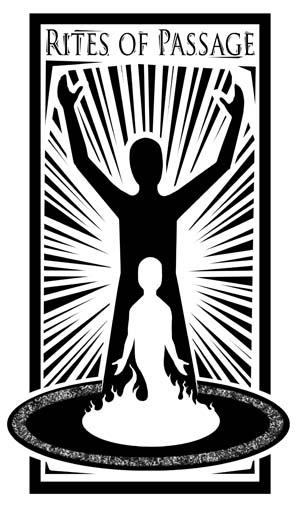Our victory for youth and Rites of Passage work
 Sunday, May 6, 2012 at 11:04PM
Sunday, May 6, 2012 at 11:04PM Our mission: Insuring that every child on the planet receives a rite of passage and mentorship into adulthood.
 I want to share our recent victory with you.
I want to share our recent victory with you.
Last weekend we had 26 of the leading lights of Teen Rites of Passage work gather in Oakland to share common challenges and victories, and to probe for ways forward as a collaborative community. Many of the hugely varied modalities of ROP practice were represented, from indigenous traditions 1000s of years old to the latest innovations in public school programs. It was a rich weekend of sharing, a deep exchange of bold visions from a collective 500+ years of experience, a sustained opening of fearless hearts. The list of our illustrious attendees is below. If you're interested, let me know and I'll send you the entire meeting agenda, co-created by many, reflecting the depth, breadth, and soulful wonder of this work.
Thank you for supporting me so I can support these soul warriors.
Attendees (not necessarily in picture)
1. Craig McClaine, Boys to Men, San Diego
2. Rick Phillips, Community Matters, Santa Rosa, CA
3. Sohrab Nabatian, Kalliopeia Foundation, San Francisco, CA
4. Kate Shela, Dolphin Connection, UK and LA
5. Arne Rubinstein, Australia Rites of Passage Institute
6. Mark Schillinger, Young Men’s Ultimate Weekend, San Rafael, CA
7. Jim Kooler, Challenge Days, Be the Change, Lifeplan Institute, Marin, CA
8. Chike Nwoffiah, Orike Theater, Mountain View, CA
9. Gigi Coyle, School of Lost Borders, Big Pine, CA
10. Jonny Nadleman, LA based school ROP co-creator, facilitator, LA, CA
11. Craig Glass, Peregrine Ministries/Passage to Manhood, Colorado Springs, CO
12. Jason Geoffrion, Men’s Leadership Alliance, Boulder, CO
13. Rabbi Goldie Milgram, Reform Bar/Bat Mitzvah practice, Philadelphia, PA.
14. Albino Garcia, La Plazita Institute, Albuquerque, NM
15. Joshua Gorman, Generation Waking Up, San Francisco, CA
16. Tony LoRe, Youth Mentoring Connection, LA, CA
17. Juliana Wells, Youth Mentoring Connection, LA, CA
18. Rich Robinson, MFT, Counseling families, teenagers, and adults, Berkeley, CA
19. Namonyah Soipan, West Indian/African/European ROP specialist, Oakland, CA
20. Darcy Ottey, formerly of Rites of Passage Journeys, Seattle
21. Mayra Zaragoza, Young Warriors, Tia Chucha, LA
22. Bret Stephenson, author of From Boys to Men: Spiritual Rites of Passage in an Indulgent Age
23. Jared Seide, Ojai Foundation, Council in Schools Initiative
24. Judy Piazza, Ojai Foundation, Land Institute
25. Sharon BearComesOut, Buffalo Visions Healing Center, Lame Deer School, Northern Cheyenne Reservation, Montana.
26. John McCluskey, PassageWorks, Jeffco Open School, Boulder, CO.
Support Staff: Donna Lee, Gerald Charles, Ajakari Mark Angelo, Ashanti Branch, Aries Jordan, Ben M.H., Marlene Shigekawa.

Last weekend we had 26 of the leading lights of Teen Rites of Passage work gather in Oakland to share common challenges and victories, and to probe for ways forward as a collaborative community. Many of the hugely varied modalities of ROP practice were represented, from indigenous traditions 1000s of years old to the latest innovations in public school programs. It was a rich weekend of sharing, a deep exchange of bold visions from a collective 500+ years of experience, a sustained opening of fearless hearts. The list of our illustrious attendees is below. If you're interested, let me know and I'll send you the entire meeting agenda, co-created by many, reflecting the depth, breadth, and soulful wonder of this work.
Thank you for supporting me so I can support these soul warriors.
Attendees (not necessarily in picture)
1. Craig McClaine, Boys to Men, San Diego
2. Rick Phillips, Community Matters, Santa Rosa, CA
3. Sohrab Nabatian, Kalliopeia Foundation, San Francisco, CA
4. Kate Shela, Dolphin Connection, UK and LA
5. Arne Rubinstein, Australia Rites of Passage Institute
6. Mark Schillinger, Young Men’s Ultimate Weekend, San Rafael, CA
7. Jim Kooler, Challenge Days, Be the Change, Lifeplan Institute, Marin, CA
8. Chike Nwoffiah, Orike Theater, Mountain View, CA
9. Gigi Coyle, School of Lost Borders, Big Pine, CA
10. Jonny Nadleman, LA based school ROP co-creator, facilitator, LA, CA
11. Craig Glass, Peregrine Ministries/Passage to Manhood, Colorado Springs, CO
12. Jason Geoffrion, Men’s Leadership Alliance, Boulder, CO
13. Rabbi Goldie Milgram, Reform Bar/Bat Mitzvah practice, Philadelphia, PA.
14. Albino Garcia, La Plazita Institute, Albuquerque, NM
15. Joshua Gorman, Generation Waking Up, San Francisco, CA
16. Tony LoRe, Youth Mentoring Connection, LA, CA
17. Juliana Wells, Youth Mentoring Connection, LA, CA
18. Rich Robinson, MFT, Counseling families, teenagers, and adults, Berkeley, CA
19. Namonyah Soipan, West Indian/African/European ROP specialist, Oakland, CA
20. Darcy Ottey, formerly of Rites of Passage Journeys, Seattle
21. Mayra Zaragoza, Young Warriors, Tia Chucha, LA
22. Bret Stephenson, author of From Boys to Men: Spiritual Rites of Passage in an Indulgent Age
23. Jared Seide, Ojai Foundation, Council in Schools Initiative
24. Judy Piazza, Ojai Foundation, Land Institute
25. Sharon BearComesOut, Buffalo Visions Healing Center, Lame Deer School, Northern Cheyenne Reservation, Montana.
26. John McCluskey, PassageWorks, Jeffco Open School, Boulder, CO.
Support Staff: Donna Lee, Gerald Charles, Ajakari Mark Angelo, Ashanti Branch, Aries Jordan, Ben M.H., Marlene Shigekawa.










